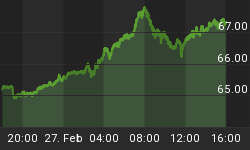Although it is not possible to determine an objective value for gold (the value of everything is subjective), by looking at how the metal has performed relative to other things throughout history it is possible to arrive at some reasonable conclusions as to whether gold is currently expensive, cheap, or 'in the right ballpark'. In particular, gold's market price can be measured relative to the prices of other commodities, the stock market, the price of an average house, the earnings of an average worker, and the real (purchasing-power-adjusted) money supply. In a recent TSI commentary I looked at the last of these, that is, I looked at gold's price relative to the real money supply, and arrived at the conclusion that gold's current price was about 20% above 'fair value'. I'll now take a look at gold relative to other commodities.
As illustrated below, over the past 20 years -- with the exception of a short-lived spike in 2011 -- major swings in the gold/silver ratio have bottomed at around 45 and peaked at around 80. The ratio is currently near the top of its 20-year range, which means that gold is expensive relative to silver.
As a consequence, to argue that there has been a successful long-term price suppression scheme in the gold market you must also argue that there has been a successful long-term price suppression scheme in the silver market. Such arguments have, of course, been put forward, with one analyst claiming that JP Morgan has managed to do the impossible by amassing a large long position in physical silver while simultaneously suppressing the price of silver by selling futures contracts.

The next chart shows that gold is also near a 20-year high relative to platinum, the implication being that gold is expensive relative to platinum.
Consequently, to argue that there has been a successful long-term price suppression scheme in the gold market you must also argue that there has been a successful long-term price suppression scheme in the platinum market. Again, such arguments have been put forward. For example, one analyst has suggested that the daily platinum 'fix' in the London market was used to manipulate the price downward over the long-term, even though there was an overall upward bias in the price over the period under analysis. For another example, an analyst has argued that the platinum price has been persistently reduced by the short-selling of platinum futures, an outcome that would only be plausible if every sale of a futures contract didn't subsequently have to be closed-out via the purchase of a contract and if automotive companies had figured out a way to replace the physical platinum used in catalytic converters with paper contracts.

The final chart shows that gold is presently near an all-time high relative to the CRB Index (an index representing a basket of 17 commodities). This chart therefore shows that gold is expensive relative to commodities in general.
As far as I know, nobody has yet tried to argue that the prices of most commodities are being suppressed as part of a grand plan to conceal the long-term suppression of the gold price. Instead, gold's expensiveness relative to commodities in general is studiously ignored.

To summarise the above: gold is currently expensive relative to many other commodities.
Almost regardless of what gold is measured against, it does not look cheap at this time. However, given what is happening to money and economies around the world, there is logic to the fact that gold is relatively expensive right now. Also, it is logical to expect that gold is going to get a lot more expensive within the next few years.
As I've explained in the past, gold is not now and has never been a play on "CPI inflation". Of course, on a very long-term (multi-generational) basis the gold price will tend to rise by enough to offset the decline in the purchasing power of money, but so will the prices of many other assets. What makes gold special is that it is the premier long-term hedge against bad monetary and fiscal policies.
Gold isn't cheap right now, but in a world that is rife with bad monetary and fiscal policies it is destined to become a lot more expensive.















